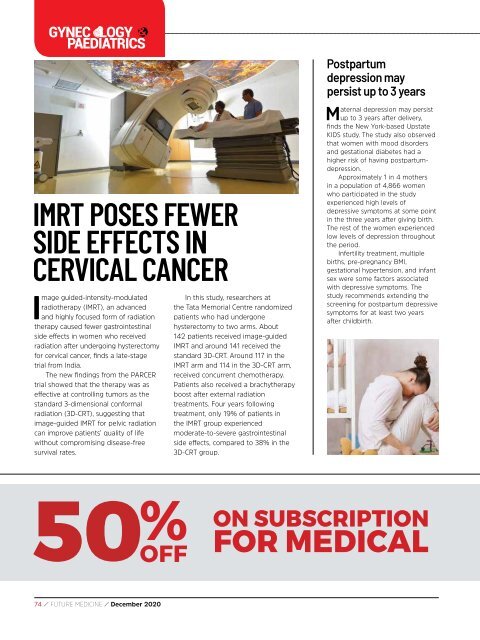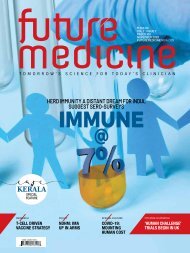You also want an ePaper? Increase the reach of your titles
YUMPU automatically turns print PDFs into web optimized ePapers that Google loves.
GYNECOLOGY<br />
PAEDIATRICS<br />
IMRT POSES FEWER<br />
SIDE EFFECTS IN<br />
CERVICAL CANCER<br />
Image guided-intensity-modulated<br />
radiotherapy (IMRT), an advanced<br />
and highly focused form of radiation<br />
therapy caused fewer gastrointestinal<br />
side effects in women who received<br />
radiation after undergoing hysterectomy<br />
for cervical cancer, finds a late-stage<br />
trial from India.<br />
The new findings from the PARCER<br />
trial showed that the therapy was as<br />
effective at controlling tumors as the<br />
standard 3-dimensional conformal<br />
radiation (3D-CRT), suggesting that<br />
image-guided IMRT for pelvic radiation<br />
can improve patients’ quality of life<br />
without compromising disease-free<br />
survival rates.<br />
In this study, researchers at<br />
the Tata Memorial Centre randomized<br />
patients who had undergone<br />
hysterectomy to two arms. About<br />
142 patients received image-guided<br />
IMRT and around 141 received the<br />
standard 3D-CRT. Around 117 in the<br />
IMRT arm and 114 in the 3D-CRT arm,<br />
received concurrent chemotherapy.<br />
Patients also received a brachytherapy<br />
boost after external radiation<br />
treatments. Four years following<br />
treatment, only 19% of patients in<br />
the IMRT group experienced<br />
moderate-to-severe gastrointestinal<br />
side effects, compared to 38% in the<br />
3D-CRT group.<br />
Postpartum<br />
depression may<br />
persist up to 3 years<br />
M<br />
aternal depression may persist<br />
up to 3 years after delivery,<br />
finds the New York-based Upstate<br />
KIDS study. The study also observed<br />
that women with mood disorders<br />
and gestational diabetes had a<br />
higher risk of having postpartumdepression.<br />
Approximately 1 in 4 mothers<br />
in a population of 4,866 women<br />
who participated in the study<br />
experienced high levels of<br />
depressive symptoms at some point<br />
in the three years after giving birth.<br />
The rest of the women experienced<br />
low levels of depression throughout<br />
the period.<br />
Infertility treatment, multiple<br />
births, pre-pregnancy BMI,<br />
gestational hypertension, and infant<br />
sex were some factors associated<br />
with depressive symptoms. The<br />
study recommends extending the<br />
screening for postpartum depressive<br />
symptoms for at least two years<br />
after childbirth.<br />
50<br />
ON SUBSCRIPTION<br />
FOR MEDICAL<br />
74 / FUTURE MEDICINE / <strong>December</strong> <strong>2020</strong>

















